The Checker Maven
The World's Most Widely Read Checkers and Draughts Publication
Bob Newell, Editor-in-Chief
Published every Saturday morning in Honolulu, Hawai`i
Noticing missing images? An explanation is here.
Speedy Delivery

With the traditional Mother's Day celebration just around the corner, you'll need the services of Speedy Delivery to get your flowers there on time! Similarly, you'll need to be pretty speedy to beat our relentless time clock on this month's pair of speed problems.
The first one is quite easy. The second one requires fast thinking and good visualization. We'll give you 15 seconds on the first one and a full minute (!) on the second. Click on the links below to show the problems and start the clock.
Whether or not you can deliver the solutions, clicking on Read More will speedily show you how it's done.
May 2006 Speed Problem 1 (easy)
May 2006 Speed Problem 2 (medium)
And now here's an off-the-wall trivia question: who played the character of Mr. McFeely (the Speedy Delivery man) on the celebrated Mr. Rogers Neighborhood television show? There's a reason why we ask.![]()
A Paisley Problem

We're not returning today to the famed and troubled sixties, those times of tye-dyed shirts, paisley trousers, lava lamps, and much more which we shan't explore here. Instead, we're going back a full hundred years to the days of J. D. Janvier, who named the go-as-you-please opening 11-16 24-19 8-11 "The Paisley," without the slightest foreknowledge of peaceniks, Haight-Ashbury, or bell-bottoms. (We understand that Mr. Janvier was, much more prosaically, instead making reference to a town in Scotland.)
Here's some interesting published play in the Paisley:
| 1. | 11-16 | 24-19 | 2. | 8-11 | 22-18 |
| 3. | 4-8 | 18-14 | 4. | 9x18 | 23x14 |
| 5. | 10x17 | 21x14 | 6. | 16x23 | 27x18 |
| 7. | 12-16 | 28-24 | 8. | 8-12 | 26-23 |
| 9. | 16-20 | 31-27 | 10. | 6-9 | 25-21 |
| 11. | 1-6 | 29-25 | 12. | 11-16 | 24-19 |
| 13. | 6-10 | 30-26 | 14. | 10x17 | 21x14 |
| 15. | 7-10 | 14x7 | 16. | 3x10 | 26-22 |
| 17. | 9-13 | 25-21 | 18. | 2-6 | 18-15 |
| 19. | 10-14 | 22-18 | 20. | 5-9 | 15-11 |
| 21. | 13-17 | 11-7 | 22. | 17-22 | 7-2 |
| 23. | 22-26 |
And so we arrive at the following position.
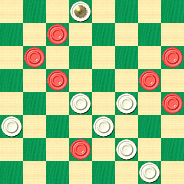
WHITE
White to Play and Win
W:W32,27,23,21,19,18,K2:B26,20,16,14,12,9,6.
Without turning to your books of published play, can you, fully on your own, find the White win? Even better, can you find Black's losing move in the play above, and correct it? To help in following the play, you can click here for an on-line animation.
If the effort frays your bell-bottoms or ruffles your Paisley trousers, clicking on Read More will bring you the answers quicker than you can light your lava lamp.![]()
Just a Little Bit of Difference

Sometimes, just a little bit of difference is all it takes... and that's the subject of today's installment in our continuing series of lessons in Checker School.
Here's the first situation we'd like to have you consider:
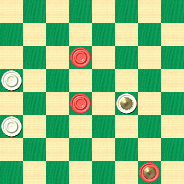
WHITE
White to Play and Win
W:W13,K19,21:B10,18,K32.
Forces are even, but the Black man on 10 is decidedly exposed, and we'd have to give the edge to White.
But now, take a look at this one:
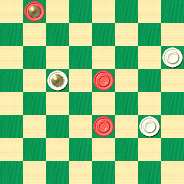
BLACK
Black to Play and Draw
B:W21,K19,9:BK32,18,10.
Not much difference, is there? It's as if White had played 13-9 in the first diagram, not at all an illogical move on the face of it, and thereby changed a win into a draw!
Checkers is indeed a subtle game, where little differences can mean a lot. Make a difference for yourself by solving these two problems, and then clicking on Read More to see the solutions, with detailed notes and a sample game.
[Read More]The Six Move Blitz

Here are two more entries from Willie Ryan's classic Tricks Traps & Shots of the Checkerboard, as we continue our long-term project of republishing the entire book for your entertainment and edification. Let's hear Willie in his own words.
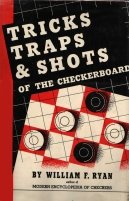
A Hole in The Dyke
The struggling tyro seems to have an unexplainable "aptitude" for walking into the following shot with his eyes wide open. I have scored with it innumerable times. To arrive at the position on the diagram, move:
11-15 22-17 15-19---A 23-16 12-19 24-15 10-19 25-22 8-11 29-25---B 11-15 27-23---C.

BLACK
Black to Play and Win
B:W32,31,30,28,26,25,23,22,21,17:B19,15,9,7,6,5,4,3,2,1.
A---Forms the Dyke, a standard opening.
B---A very weak move, but drawable; 27-23 or 17-13 would be better.
C---Hooked! The following series of moves draws narrowly and corrects important play by F. Teschelheit: 17-13, 4-8, 21-17*, 7-10, 27-23, 8-12, 23-16, 12-19, 31-27* (the only move to draw, correcting Teschelheit, who gives 32-27 to a black win), 2-7 (if 3-8, 17-14 draws; if 9-14, 27-23 draws), 27-23, 19-24, 28-19, 15-24, 23-18, 7-11, 17-14, 10-17, 25-31, 3-7, 21-14, 24-28 (11-16, 14-10, white wins), 22-17, 11-16, 26-22, 16-19, 30-26, 7-11*, 14-10, 6-15, 13-6, 1-10, 18-14, 19-23, etc., drawn. Wm. F. Ryan.
A Six-Move Blitz
Among the most effective six-move killers is this well-known example on the Denny opening. Set up the pieces for play. Now move 10-14, 23-19, 11-16, 26-23, 9-13, 20-24---A, and we get the layout of pieces pictured here.
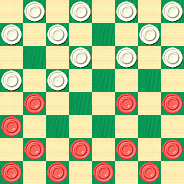
BLACK
Black to Play and Win
B:W32,31,30,29,28,27,25,23,22,21,20,19:B16,14,13,12,8,7,6,5,4,3,2,1.
At A, instead of 24-20, white can get a good game by 22-17, 13-22, 25-9, 5-14, 29-25, 7-11, 25-22 (not 24-20, 14-18), 6-10, 22-18, 1-5, 18-9, 5-14, 30-25, 11-14, 25-22, 16-20, 22-17, 8-11, 17-13, 2-6, 31-26, 12-16, 19-12, 11-16, 13-9, 6-13, 26-22, 16-19, 23-16, 3-7, 22-18, 15-22, 16-11, 7-16, 24-19, 16-23, 27-9, 10-15, 9-6, 22-26, 6-2, 15-19, 32-27, 4-8*, 12-3, 26-31; resulting in a draw.
When you've blitzed these problems, and are sure there are no holes in your solutions, you can click on Read More to see how Willie worked these out.![]()
A Little Lighter

After a rather heavy-duty problem last month, this time we're heading to the somewhat lighter side with a stroke problem that should entertain without baffling. Well, not too much.
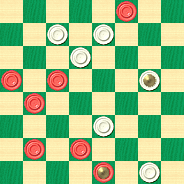
WHITE
White to Play and Win
W:W6,7,10,K16,23,32:B3,13,14,17,25,26,K31.
So, lighten up, solve the problem, and then see the light by clicking on Read More.![]()
Breaking Even: A Taxing Problem
Sometimes, breaking even is the best you can do.

That is never more the case than when dealing with the United States Internal Revenue Service. And the publication date of this article, April 15, 2006, is the traditional American tax day, on which income tax returns --- and final payments --- fall due.
Keeping that theme in mind --- of doing everything you can to just break even --- take a look at today's feature problem.

BLACK
Black to Play and Draw
B:W28,26,24,K3:B19,15,14,2.
Forces are even, but White has a king and Black is going to have to struggle just for a draw.
Tax your brain, then file your solution before paying up by clicking on Read More to see how it's done.![]()
Finishing the Job

As yet another teaser from our very soon to be released electronic republication of Richard Pask's Key Themes, we bring you a situation that Mr. Pask takes as far as a Black win, but leaves it to you to finish the job.
Here's a runup to the diagram:
| 1. | 10-14 | 22-18 |
| 2. | 11-15 | 18x11 |
| 3. | 8x15 | 24-20 |
| 4. | 6-10 | 28-24 |
| 5. | 1-6 | 23-19 |
| 6. | 9-13 | 25-22 |
| 7. | 6-9 | 29-25 |
| 8. | 4-8 | 26-23 |
| 9. | 14-17 | 21x14 |
| 10. | 9x18 | 23x14 |
| 11. | 10x26 | 31x22 |
| 12. | 7-10 | 25-21 |
| 13. | 8-11 | 27-23 |
| 14. | 5-9 | 23-18 |
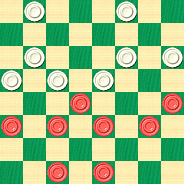
BLACK
Black to Play and Win
B:W32,30,24,22,21,20,19,18:B15,13,12,11,10,9,3,2.
Can you find where White went wrong, and correct the play, and then can you find the winning move for Black and finish the job?
When you think your work is complete, finish off by clicking on Read More for solution and commentary.![]()
So What, and Big Deal

This is a busy week, as our second feature article contains two substantial problems, related in a way that will become clear later on, and sharing a common thread of thought: at first glance, you're likely to say "So What" or even "Big Deal."
But these problems are the compositions of that noted problemist of a bygone era, Mr. Chas. Hefter, a checker force not to be taken lightly, so perhaps we should avoid hasty judgments.
Here's the first one:
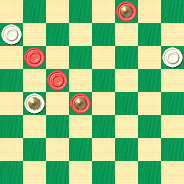
BLACK
Black to Play and Draw.
B:W28,21,K16:BK30,24,19,K15.
Well, "So What?" Black is a man up and we're just asking for a draw... oh... wait.... Black is about to lose a man and... a second one... so Black will be a man down... hmm, maybe there is something to this after all.
And now the second situation:
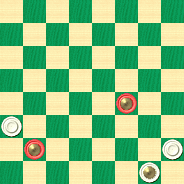
WHITE
White to Play and Win
W:W21,28,K32:BK19,K25.
So, "Big Deal." White is a man up and what else should he do but win? Oh.... the king and man jammed into the double corner could make it harder... hmm, maybe it's not as easy as it first looked.
Try out the problems but if you are stumped, so what. Clicking on Read More to see the solutions is no big deal.![]()
Today Is The Day
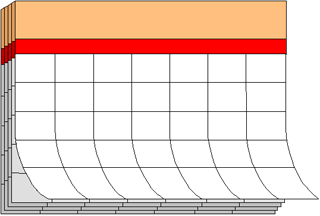
Some of our problems, we admit, can be on the tough side, especially for the average player. But today, we'll give you a checker problem that is easier than you might think:

WHITE
White to Play and Win
W:W22,26:B9,10,13
Can you find the trick that gives White the win? Today's the day for you to solve this problem!
Click on Read More for the surprising solution.![]()
What's Your Hurry?

To open the month, we've chosen a speed problem that may take you a bit longer than some of the others we've run in the past. In fact, we were right on the edge in our decision as to whether or not this is a true speed problem; but the solution is simple and snappy... once you see it.
You know the drill. Click below to show the problem and start the clock. We've allowed you three minutes on this one, but what's your hurry?
We're sure of one thing, though; we know you won't lose any time clicking on Read More to reveal the solution.![]()
The Checker Maven is produced at editorial offices in Honolulu, Hawai`i, as a completely non-commercial public service from which no profit is obtained or sought. Original material is Copyright © 2004-2025 Avi Gobbler Publishing. Other material is public domain, as attributed, or licensed under Creative Commons. Information presented on this site is offered as-is, at no cost, and bears no express or implied warranty as to accuracy or usability. You agree that you use such information entirely at your own risk. No liabilities of any kind under any legal theory whatsoever are accepted. The Checker Maven is dedicated to the memory of Mr. Bob Newell, Sr.

